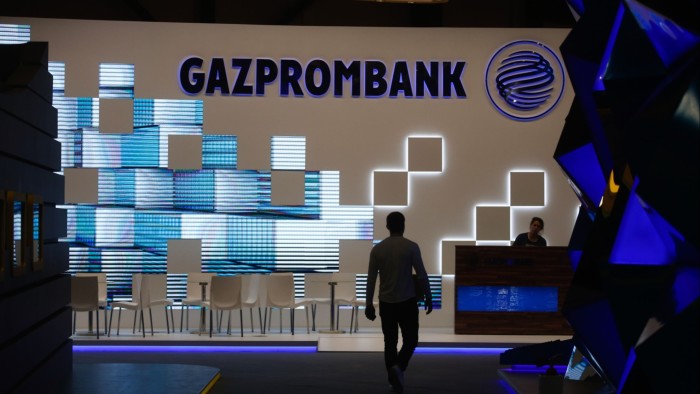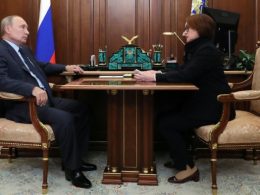Unlock the White House Watch newsletter for free
Your guide to what the 2024 US election means for Washington and the world
The US has imposed sanctions on Gazprombank, one of the few major Russian lenders not already blacklisted over Moscow’s invasion of Ukraine, in a move aimed at restricting the Kremlin’s ability to finance its war effort.
The listing announced on Thursday in effect bans state-owned Gazprombank, the main conduit for Russian energy payments, and its six international subsidiaries from the US-dominated global finance system.
Russia has used Gazprombank as a conduit to buy military equipment for the war in Ukraine, as well as to pay soldiers and compensate the families of those killed in action, according to the US.
“This sweeping action will make it harder for the Kremlin to evade US sanctions and fund and equip its military,” US Treasury secretary Janet Yellen said.
“We will continue to take decisive steps against any financial channels Russia uses to support its illegal and unprovoked war in Ukraine.”
The UK and Canada both imposed sanctions on Gazprombank in the early weeks of the war in 2022.
The US had previously avoided following suit largely so that European countries could continue to pay for Russian gas supplies.
During the war, however, the EU has sharply reduced its reliance on Russian pipeline gas from 40 per cent to less than 8 per cent of the bloc’s energy mix.
The fresh sanctions come as contracts for Russian gas transit through Ukraine to European countries including Slovakia and the Czech Republic expire on January 1. After the Nord Stream pipelines connecting Germany to Russia via the Baltic Sea were blown up in 2022, this became one of only two routes by which Russian pipeline gas is exported to Europe.
Kyiv has refused to negotiate an extension of the transit contracts, meaning that the remaining Russian supplies will dry up and will no longer have to be paid for. “The agreement with Russia will not be renewed, period, end of story,” Ukrainian President Volodymyr Zelenskyy said in August.
However, according to an S&P report from October, Russia continues to sell nearly 70 per cent of its liquefied natural gas to Europe, though these volumes are significantly lower than pipeline supplies. While the US and UK have banned Russian LNG, the EU sourced 20 per cent of its LNG from Russia. The Financial Times reported that Germany has recently decided to reject Russian gas cargoes, indicating a potential shift in this balance.
Gazprom, Russia’s state gas export monopoly, also cut supplies to Austria earlier this month after a court ruled it owed energy company OMV €230mn.
The US sanctions will close one of Russia’s few remaining windows to international banking by barring Gazprombank from transacting in dollars.
Washington is also seeking to discourage foreign banks from doing business with Russia by threatening secondary sanctions against those that process transactions for Russia’s war machine.
As part of that effort, the US warned banks in third countries they risked sanctions if they signed up to Russia’s System for Transfer of Financial Messages, a Kremlin-backed alternative to the Swift banking messaging system.
The Treasury said it viewed joining the Russian payments system “as a red flag and is prepared to more aggressively target foreign financial institutions that take such action”.
The US also imposed sanctions on more than 50 small Russian banks and 40 securities registrars, and 15 technocrats it said were involved in “abusing the international financial system to pay for the technology and equipment it needs to sustain its illegal and unjust war against Ukraine”.
The push has hit Russia’s imports by deterring counterparties in neutral countries and forcing banks to process transactions through complex networks of intermediaries.
In September, Russia’s economy ministry revised its forecast for imports in 2024 down by 9 per cent to $295bn from its April prediction of $324bn.
Russia’s central bank said this month that the payments sanctions had created a “significant” rise in costs and difficulties supplying raw materials by making it difficult for importers to settle transactions.
Source link









